Reviews
Rope of Love
Russ Meyer
USA, 1965
Credits
Review by Andrew Schenker
Posted on 28 August 2008
Source RM Films International DVD
Categories Bosomania!: The Sex, the Violence, and the Vocabulary of Russ Meyer
In Mudhoney’s gallery of rural grotesques, none is more grotesque than Sidney Brenshaw. Amid toothless madams, popeyed rubes and limping preachers (whose physical perversions are emphasized in a series of wide-angle close-ups), no one quite compares to Brenshaw. As played by Hal Hopper, his leather face continually (and unnaturally) contorted into an oily hee-haw laugh or twisted into high-pitched howls of rage, Brenshaw makes for a suitably outrageous villain. Drunkenly swaying about town in a dirty suit and cowboy hat - and never seen without his bottle of corn liquor - he’s a man of pure libido, working his tongue slowly, horrifyingly across his lips whenever he gets aroused and then pouncing with jolting savagery onto any number of unsuspecting woman. If the film’s energy inevitably lags whenever Brenshaw’s absent from the action, his frequent onscreen presence ensures that the film rarely lacks for demonic force.
Set during the Depression (or, as the characters call it, the “De-pression”), Russ Meyer’s hicksploitation flick finds drifter Calif McKinney stopping in at a lawless Missouri town en route to California. Just released from prison and hoping to start anew, Calif takes a job on a local farm where he immediately falls in love with the owner’s niece, Hannah, while running afoul of her husband, the villainous Brenshaw. At stake is the deed to the farm, which the owner, the kindly Lute Wade - in precarious health because of his “bum ticker” - wants to keep from passing into Brenshaw’s hands upon his death. When that latter learns of Lute’s decision to leave the farm to Calif, he enlists a hate-spewing preacher to turn the locals against his adversary and eliminate the double threat (to his marriage and his inheritance) from the town.
Central to Brenshaw’s strategy, as well as Meyer’s concerns, is the susceptibility of the townspeople to outbursts of violent reprisal. As Lute, one of several “good” characters in the film, explains, in the midst of the economic hardships, people are always on the lookout for a scapegoat onto whom to project their misery and seek displaced reprisal through bloody retribution. In a town in which the forces of law and order are more or less completely ineffectual (as the town’s local madam explains early on when questioned about the illegality of her bootleg liquor, “folks around here don’t pay no mind to that foolishness”) and public opinion counts for everything, manipulating the general tide of feeling becomes the only way to ensure one’s continued survival. We soon learn that Brenshaw is singularly unpopular in town and on the verge of being run out thanks to the machinations of Thurmond Pate, a little gnome of a man with one eye-ball turned horribly out of place and, while no motive is given for Pate’s hatred, we can probably assume that it rests on some sort of sexual jealousy directed against his virile, if loathsome, antagonist. Adopting a similar strategy, Brenshaw turns the attention away from himself and onto Calif, showing that in a small town the only thing worse than a loathed insider is any kind of outsider at all. Meyer’s film, released in 1965, culminates in a lynching, and while the filmmaker doesn’t seem to be making any sort of explicit racial commentary (in fact, all the picture’s characters are white), he certainly paints a vivid portrait of the type of hate-filled atmosphere that allows for the perpetuation of such racially-motivated atrocities, whether in the Depression era or in the mid-1960s of the film’s release.
So much of the film’s drama turns on questions of sexuality that it is important to consider the two conceptions of sexual behavior - seemingly opposed but really closely related - that Meyer outlines. One form of sexuality is embodied in the jealous, aggressive practices of Sidney Brenshaw. Sexually insatiable (and given to taunting other men for their lack of “manhood”), Brenshaw spends much of his time at the local brothel before returning home to rape and beat his wife, whom he continually subjects to accusations of disloyalty. When faced with an unwilling sexual prospect - as occurs several times during the film - his method is always the same: throw the woman to the floor, kiss her repeatedly and then rip off her shirt and bare her breasts, a ritual of exposure that allows him to assert his manhood through sexual humiliation. In seeming contrast to this desperate need for dominant assertion, is the attitude offered by the local prostitutes. A household of three, the aging toothless madam who “ain’t turned a trick in fifteen years” and her two nubile daughters, the town brothel exemplifies an unrepressed vision of sexuality. While one daughter, Clara Belle, skinny dips in a lake, while favorably comparing the “birthday suit” to the “bathing suit” as the proper swimming attire, the other daughter, the deaf and dumb Eula, like her namesake in Faulkner’s The Hamlet, remains blithely untroubled by her burgeoning sexuality, a buxom naïf unaware of any consequences to her behavior. While the carefree brothel atmosphere may seem to represent some sort of ideal of free sexuality, it’s clear that the ease with which the women give themselves to Brenshaw fuels his attitude towards women to the point where he expects all potential partners to yield as easily to his advances. When they don’t, his violent jealousy comes into play and gives rise to the film’s manifold sexual disasters. Only the film’s central couple, Calif and Hannah, seem to offer a solution - combining non-jealous union and obvious sexual attraction - but, despite allowing Meyer to indulge in some lyrical photography during their central courtship that’s oddly reminiscent of Sergei Urusevsky’s work with Kalatazov, the romantic leads are too dully conventional to suggest any kind of desirable outcome. Rather Meyer’s extraordinary film focuses its energy on outlining the distortions to healthy sexual congress that result from a possessive, insistently masculinized attitude towards carnality and, in channeling these perversions into that ultimate screen grotesque, Sidney Brenshaw, giving inimitable expression to the wretched extremes of debased sexuality.
More Bosomania!: The Sex, the Violence, and the Vocabulary of Russ Meyer
-

The Immoral Mr. Teas / Eve and the Handyman
1959 / 1961 -
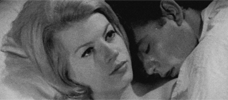
Lorna
1964 -
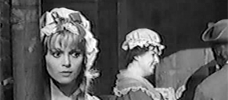
Fanny Hill
1964 -

Mudhoney
1965 -
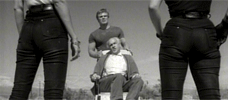
Faster, Pussycat! Kill! Kill!
1965 -
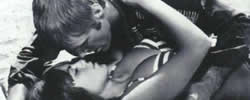
Motor Psycho
1965 -
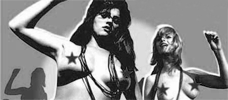
Mondo Topless
1966 -

Common-Law Cabin
1967 -

Good Morning and… Goodbye!
1967 -
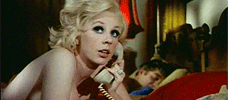
Finders Keepers, Lovers Weepers!
1968 -

Vixen!
1968 -

Cherry, Harry & Raquel!
1970 -
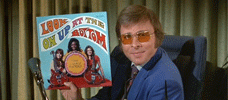
Beyond the Valley of the Dolls
1970 -

The Seven Minutes
1971 -

Black Snake
1973 -

Supervixens!
1975 -

Up!
1976 -

Beneath the Valley of the Ultravixens
1979
We don’t do comments anymore, but you may contact us here or find us on Twitter or Facebook.



